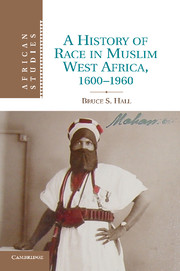Book contents
- Frontmatter
- Contents
- List of maps and figures
- Acknowledgments
- Note on orthography
- Abbreviations used in references
- Glossary
- Introduction
- PART ONE Race Along The Desert Edge, C. 1600–1900
- PART TWO Race And The Colonial Encounter, C. 1830–1936
- PART THREE The Morality of Descent, C. 1893–1940
- 5 Defending Hierarchy
- 6 Defending Slavery
- 7 Defending the River
- PART FOUR Race and Decolonization, C. 1940–1960
- Conclusion
- Index
- Misc-endmatter
- References
7 - Defending the River
Songhay Arguments about Land, c. 1893–1940
Published online by Cambridge University Press: 05 August 2011
- Frontmatter
- Contents
- List of maps and figures
- Acknowledgments
- Note on orthography
- Abbreviations used in references
- Glossary
- Introduction
- PART ONE Race Along The Desert Edge, C. 1600–1900
- PART TWO Race And The Colonial Encounter, C. 1830–1936
- PART THREE The Morality of Descent, C. 1893–1940
- 5 Defending Hierarchy
- 6 Defending Slavery
- 7 Defending the River
- PART FOUR Race and Decolonization, C. 1940–1960
- Conclusion
- Index
- Misc-endmatter
- References
Summary
“THE RIVER BELONGS TO US, THE BUSH BELONGS TO GOD
Whatever their difficulties and frustrations in administering pastoralist groups, French administrators admired the noble stratum among the Arabs and Tuareg. Their opinion of the sedentary, mostly Songhay-speaking people of the Niger Bend was almost exactly the opposite. Described as passive, racially degenerate, cowardly, and dishonest, the sedentary population was seen as ignoble by French officials. In the official publication on behalf of Soudan Français on the occasion of the colonial exposition in Paris in 1931, the Governor General of French West Africa echoed almost exactly the racial ideas of the nineteenth-century race polemist Arthur de Gobineau:
By the way that they appear today, the Songhay could not have played the brilliant role attributed to them in the history of the Soudan. In reality, that history took place in their land, but only involved them in a passive way. The Songhay have never constituted a people of warriors or rulers, with the exception of some Sorko clans which have always had the instincts of pillagers and conquerors. The so-called Songhay Empire was from beginning to end governed by Berber and Soninké princes, to say nothing of the periods when it paid tribute to the Mandingos, Mossi, and the Tuareg. The rare powerful rulers who gave some prestige to that empire depended for their power on an army recruited from other places. The mass of the Songhay people are composed of farmers, fishers, and merchants, who are defenseless and of mediocre intelligence, and were endlessly at the mercy of invasions, raids, and revolutions which descended to the banks of the river from the lower to the middle Niger until the French conquest.[…]
- Type
- Chapter
- Information
- A History of Race in Muslim West Africa, 1600–1960 , pp. 241 - 272Publisher: Cambridge University PressPrint publication year: 2011



